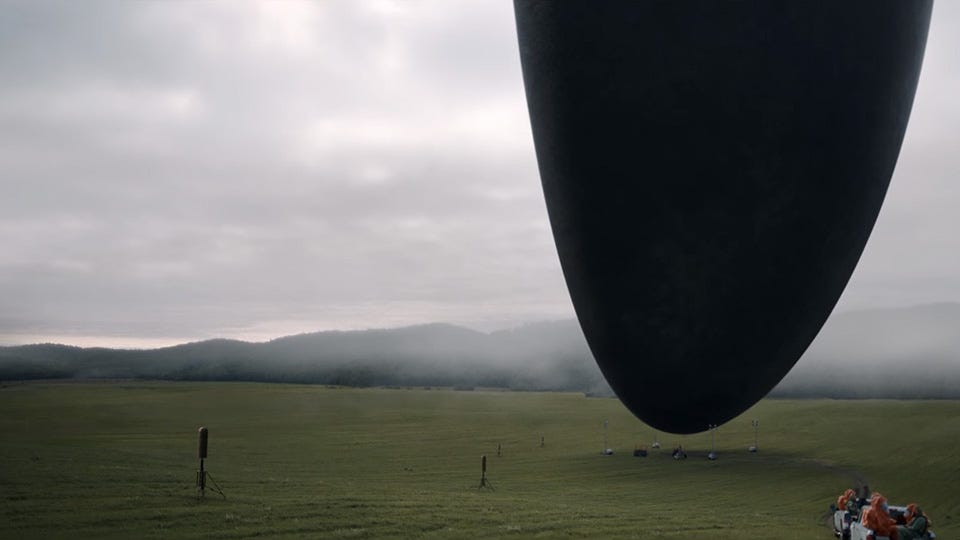As the world becomes more deranged and bad theory comes to infect and influence more and more of my society I take refuge in the same distant castle that I often visited as a child: the realm of imagination, of fiction and science fiction and fantasy. Even those territories are not untouched by the rot, of course. Publishers are trying to make ALL fictional works conform to the new Leftist totalitarian value set and book awards are being manipulated and subverted to serve the interests of the powerful… but into these halcyon places I can safely retreat, for the landscape itself is formed by the interaction between my mind and the book or film in which I’m engrossed, and my mind (and my bookshelf) are still my own. Many people would love to exercise control over even those small and remote patches of ground, but they are easily hidden and resist bureaucratic control fiercely.
Some of the trailers for the Denis Villeneuve film Arrival (2016) make the film seem like a suspenseful alien contact movie, or even an action thriller. This was probably deemed wise by the marketers of the film but it is not accurate and its inaccuracy is apparent within the first minute of the film.
The film opens with a voiceover by Dr. Louise Banks (Amy Adams), the film’s protagonist, and a mournful string-based score (Max Richter’s On the Nature of Daylight). “I used to think this was the beginning of your story… “ Louise says, in a voice-over. “I remember moments in the middle,” with blurry, cool-lit images of a girl playing with her mother. “And this was the end.” We see an even blurrier hospital bed, and the still visage of a girl. Then, Louise says that she’s not sure she still believes in beginnings and endings.
We see Louise walking down a dark hallway (symbolic of death, and grief). Then: “There are days that define your story beyond your life… like the day they arrived.”
In a series of brief scenes we gather two primary pieces of information:
Louise Banks is a quiet and not-very happy woman. She’s a professor who lives in a bayside or beachfront or lakefront house (the same house and lawn seen in the initial scenes). She’s habit-bound and disconnected, without many friends and with a strained maternal relationship. On the phone she says “you know me, mom… I’m about the same.” We sense that she has been in this state of cautious and static loneliness for some time, resisting change and connection.
Something big is happening in the country, or the world. We see the cloudy campus, in which Dr. Banks is presumably an instructor. We see her classroom, deep in shadow and containing only 7-8 distracted students, scattered around the lecture amphitheater. A student asks for the news to be put on… and Dr. Banks does and we see the footage of the alien ships and hear the announcer: 12 huge ovoid craft have appeared at random, suspended serenely over various patches of Terran ground. As she leaves campus there are anxious crowds, traffic jams, security.
Later, Col G. T. Weber (Forest Whitaker) appears at her home and briefly interrogates her. As he leaves (seeming to dismiss her and her participation in this urgent government effort) she tells him to “ask [the other linguist in consideration] the Sanskrit word for war and its translation.”
We learn a few more things:
Dr. Banks is intelligent. She seems to know Sanskrit better than her peers, for one thing, and she is quick to deploy white boards to try to interact with the aliens and fabricate anecdotes about European-aboriginal communication to support her points.
Dr. Banks is anxious. She quietly hyperventilates on approach to the craft, for their first session, and she almost freezes before beginning her task. She must be accompanied by Ian Donnelly (Jeremy Renner - the physicist who joins her on their visit into the alien ship and who is established as the math/science leader of their team) and urged along by Col. Weber.
These pieces of characterization and world-building set the stage for a fairly profound, yet entertaining story, which includes an explanation of the Sapir-Whorf model of language (the idea that linguistic structure and detail strongly affects the manner and way of thinking) and the slow realization that something else is going on here. We’re not just watching a ET mystery thriller or a science epic where a very smart woman tries to talk to aliens.
The heptapods arrive simultaneously in 12 locations on Earth in great hovering avoid ships, thousands of feet long (tall).
The aliens are dubbed ‘heptapods’ (seven-feet) and they look like large grey hands propped up on (seven) splayed fingers (their legs). They are protected within their ship (the setting for every appearance and human interaction) behind a transparent wall and shrouded in a thick mist, which makes the CGI effects easier to render and believe, and increases the feeling of mystery and slightly eldritch suspense. Dr. Banks has the idea of bringing white boards in with the communication team and her written efforts to identify herself as a human, and someone named ‘Louise’, prompt a reaction: ink swirls from one of the heptapod’s limbs and forms a kind of writing: a circular, bold, varied symbol.
The Heptapods make low, booming, rumbling sounds but they communicate with humans using circular, non-linear orthogonal ideograms which appear on the species/species divider inside their ship.
The heptapods have travelled to Earth to help humanity. ‘Costello’ (Dr. Banks and Dr. Donnelly name the two heptapods Abbot and Costello) tells Louise that in 3,000 years the heptapods will need humanity’s help, and they know this because they perceive time differently. They have a kind of reflexive prescience, a simultaneous apprehension of past, present, and future… and now (because she has begun to learn their language) Louise is developing this prescience as well.
The contextual explanation for the aliens’ visit and the functional effects of their language are artfully introduced only towards the end of the film, but we see strange and vivid flashbacks throughout the film that seem to become more frequent and sustained as the plot progresses. We initially write these off as a normal film-making tool… but we begin to suspect that something else is happening, for Louise perceives these flashbacks not as flashbacks at the time but as strange and profound visions which confuse and disturb her.
There is a subplot involving geopolitical differences between China and her allies and everyone else, and a (ridiculously small and inept) rogue element of US military personnel who have become convinced that the aliens are an urgent threat and should be attacked, and Louise eventually stealing the CIA officer (Michael Stuhlbarg)’s phone and calling the de facto leader of the Chinese response, General Shang, and convincing him to stop an imminent military confrontation with the heptapods and share intelligence in a reciprocal arrangement with the Americans and our allies by telling him the words that his wife spoke on her deathbed. She learns the words and gets the General’s phone number long after the aliens have left but has access to that information during their visit and is well-placed to influence the various human factions toward inter-species peace and international cooperation… because she can essentially see the future. I didn’t much enjoy these subplots and I found the minor themes about human psychology rather less compelling than the observations about memory and time and loss. I don’t think that international fractiousness or renegade army enlistees would be factors in an overt alien visitation; I think that humanity would become more united than ever in such circumstances. Rather than worsening our geopolitical differences I imagine such an event would be more conducive to international peace and world government than any other event in our history.
That supposition has led me to wonder whether the recent government publicity around UAP’s (unidentified aerial phenomena) is not part of a secret plot to unify humanity and erode national sovereignty and hand more power over to secretive technocratic bureaucracies… but I have no evidence of that. As I’ve written elsewhere: something is going on with the hundreds of bizarre, confirmed encounters and, whatever it is, it is wondrous and extremely important. It’s either aliens OR it’s an unprecedently skillful psy-op OR it’s evidence of technology so advanced as to be almost magical OR… something else.
By the end of the film, all the pieces have fallen neatly into place: Louise and Ian were introduced during the heptapod contact event and worked together for weeks. They began to fall in love and after the aliens left they got married (assumedly) and had a daughter. Due to her careful work with the aliens and her internalization of their language she began to perceive time differently and now sees things years before they happen. Due to this, Louise knows that her daughter will die of a rare illness sometime in early adolescence and when she tells her husband (10 or 11 years after their daughter’s birth) he can’t accept the reality and leaves a broken man, angry at Louise and the cosmos. Early in the film we see the death of Louise’s daughter She is named Hannah-a word which, like the heptapods’ non-linear orthogonal script, is read the same in both directions (a palindrome). The scene is brief and cool-light saturated and blurry, with evocative music and Louise softly weeping and pleading for her daughter to return. We now understand the confusing and sentimental opening frames of the film; the story falls neatly into place.
There are plenty of logical issues with the plot of course: perceiving time non-linearly doesn’t actually mean seeing flashbacks. The flashbacks themselves are linear… they’re just out of chronological order. Like a 4th or 5th spatial dimensions, humans literally cannot imagine or describe what it might be like to perceive the future simultaneously with the present. If Louise develops this ability by learning the aliens’ writing, does everyone else who learns their script acquire this world-bending power? She does write a bestseller about their language, after all (‘The Universal Language’). What effects might this have on society and on our collective fate? Surely learning the heptapod language would fast become the most powerful and profound ability on them all-much better than reading or math. Is it the internalization of the heptapod script that imbues Louise with this power? What then is the script itself saying? We learn that the aliens have given us a huge image file and Dr. Donnelly realizes that the voids in the 3d diagram represent exactly 11/12 of its total space… and the aliens have landed in 11 other locations on Earth. What was THAT file saying then? A guide to construction of Dyson spheres or Alcubierre drives? Perhaps the American effort to understand the most unique and consequential event in our species’ history would involve more than a single smart physicist and a single well-respected linguist with some initiative… but none of those objections really detract from the film.
It is a well-done movie which develops Louise as a character, introduces interesting scientific and linguistic concepts into the alien contact scenario, and intersperses its primary plotline with a melancholy contemplation on time and family and grief. We are pushed to ask if Louise would have walked down her path if she knew where it would lead-and we know that she would, because she did. We are consequently encouraged to walk down our own individual paths of trouble and loss and grief with a kind of acceptance and-ultimately-celebration which validates existence itself. Arrival is a perfect example of a universal narrative truth: every alien contact movie is really a movie about the nature of humanity. At the end of the day, every alien contact story is a story about ourselves.









